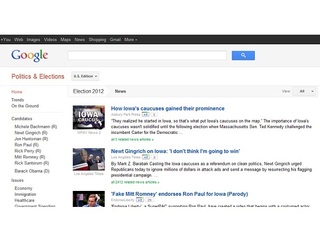Trump rescinds Biden executive order on artificial intelligence
The EO set AI safety and security standards and called for a report on AI's impact on labor
Read more...
Facebook and political news publication Politico have announced a new integration of Facebook social networking data with Politico's reportage of the 2012 US Presidential election. Even though at first blush you might wonder whether there's enough Republicans on Facebook, and social networks in general, to get an accurate reading, surveying Facebook might actually produce solid data.
Politico will be given exclusive surveys by Facebook, containing data about volume of Facebook posts, status updates, and links among voting age users, as in this story about the days leading up to Mitt Romney's win in the New Hampshire primary. The data collection process will be automated, so no one will be reading your Facebook activity, so says Facebook.
Also, data collection from people's Facebook pages will be filtered through tools to "infer sentiment" concerning mentions of a given candidate. So what this all means is that, if you say something about Ron Paul, Facebook's data collection technology will be able to tell if your comment is positive or negative, and then graph it accordingly.
Incidentally, Ron Paul was supposedly the Republican candidate most-mentioned on Twitter, according to a similar analysis, leading up to the New Hampshire primary. The fact that Paul finished a distant second to Mitt Romney in the NH primary should speak to the value of social networking data, as a prediction of voting behavior.
"This highly competitive primary season has demonstrated that technologies like Facebook enhance the connections and conversations that are happening every day between voters and the presidential candidates,” said vice president of U.S. Public Policy at Facebook, Joel Kaplan, via the company's release.
Sure conversations are rampant on Facebook. But did Facebook think about the fact that Republican votes, generally, tend to skew into older demographics, while social networking, generally, tends to skew younger?
According to exit polls for the US Senate elections in November 2010, in which Republicans gained ground, under-30 voters were the only age demographic to vote Democrat. Keep in mind, it's typical for the party not sitting in the White House to gain ground in mid-term elections. The point is that, even taking that into account, young people still voted Democrat in November.
Another poll conducted in in November by Pew Research shows that age will play an important factor in the 2012 Presidential election, with young people of the Millenial Generation showing strong numbers for President Obama, as opposed to his strongest Republican competitor at that time, Mitt Romney. Yet another poll by Pew shows that Republicans are, generally, unenthused by their party's candidates in 2012.
Meanwhile, a poll taken by Ignite Social Media in April 2011 found that Facebook is almost as popular among people aged 45-54, as those in the 25-34 bracket. So by way of an extremely unscientific correlation, we can see that, yes, there might be enough of a percentage of Republicans on Facebook that these polls could at least somewhat represent what the party thinks.
Add to that yet another analysis, claiming that Republican candidates for the 2010 Senatorial elections had an average of four times as many Facebook fans, and five times as many Twitter followers, as their Democrat counterparts.
[Image Credit: Facebook]
The EO set AI safety and security standards and called for a report on AI's impact on labor
Read more...The agency also published draft guidance on the use of AI in drug development
Read more...The biggest focus areas for AI investing are healthcare and biotech
Read more...


